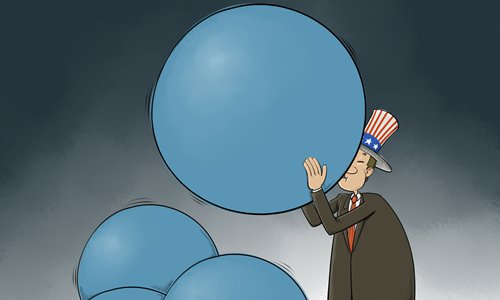HOME >> OPINION
US using threat theory to mislead Japan in policy toward China
Source:Global Times Published: 2019/10/29 17:53:41

Photo: IC
Citing China as "a particular risk," an anonymous US military officer said on October 21 that Japan must inform its public of the "China threat," and China's weapons inventory "threatens Japan as well as others in the region," according to a Bloomberg report.
This officer's remarks can be regarded as another example of Washington engaging in great-power geopolitical competition, which comes as the primary consideration of the US in dealing with international affairs relating to the Asia-Pacific region and Europe. The officer's address is in line with the current foreign strategy of the US government.
In dealing with China, Washington has been striving to reinforce its allies' presence and strength surrounding China, an attempt to get itself extra pairs of hands in its future military competition with China.
It is not surprising to see the anonymous US military officer's remarks. As the most important US ally in the Asia-Pacific region, Japan has been pivotal to the US security strategy in Asia. This officer's words suggest Washington may be making new moves to strengthen Tokyo's military might by getting rid of various legal restraints, in order to restrict or slow China's development.
Since the end of World War II, Japan's military advance has been highly restricted by Article 9 of the Japanese Constitution - Japan cannot possess offensive military weapons. The Constitution has made it clear what kinds of military strength Japan can have, and determined that all the country's military power can only be defensive rather than offensive. Any ambitious Japanese politicians who intend to enhance Japan's military are highly restrained by the Constitution.
To strengthen Japan's military power, the US has to firstly incite the Japanese people to accept the incumbent leadership's attempt to amend the Constitution. Japanese Prime Minister Shinzo Abe is one of those politicians harboring an intention to revise Article 9, as he also wishes to ensure Japan's security by strengthening its own military forces. No country can completely rely on another for its own security.
The US-Japan security treaty and the US military presence in Japan reflect that Japan does not enjoy full sovereignty. From this perspective, Japan is an exception among developed countries. Although Japan is struggling to maintain independence in self-defense, without coordination from the US, it would be hard for Japan to enhance its self-defense capabilities. If restrictions are lifted, Japan will surprise the world with its military growth in the Asia-Pacific region. In this context, Washington's stance toward the amendment of the Japanese Constitution is quite clear - it now prefers to see Japan break through the relevant restrictions.
China-Japan ties have been getting back on track since falling to their lowest point in 2012. In October 2018, Abe paid the first visit made by a Japanese prime minister to China in seven years. The Japanese prime minister vowed to open up a new era in China-Japan relations and push bilateral ties to "a new stage" in early October this year. The good momentum of the bilateral ties is in line with the needs of both countries.
What worries the US most is whether Japan will question the guidance from the US amid Japan's close cooperation and interactions with China. By reinforcing the US-Japan alliance and informing the Japanese public of the "China threat," the US intends to warn Japan not to move too close to China and to some extent constrain Japan's independence in its policy toward China.
The success of the US policy toward Japan is measured by whether Japan can help the US effectively counterbalance China in the Asia-Pacific region. Thus, US policy toward the Asia-Pacific and Japan would have something of an impact on the betterment of China-Japan relations.
In the short term, the US would play a big role in affecting China-Japan ties. However, the future of the China-Japan relationship is determined by the two countries based on their interests. If US meddling or influence undermines Japan's interests, Japanese politicians may keep their distance from the US when they make decisions.
The article is compiled by Global Times reporter Lu Yuanzhi based on an interview with Li Haidong, professor at Institute of International Relations, China Foreign Affairs University. opinion@globaltimes.com.cn
Posted in: VIEWPOINT,ASIAN REVIEW